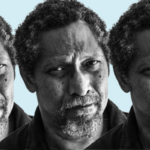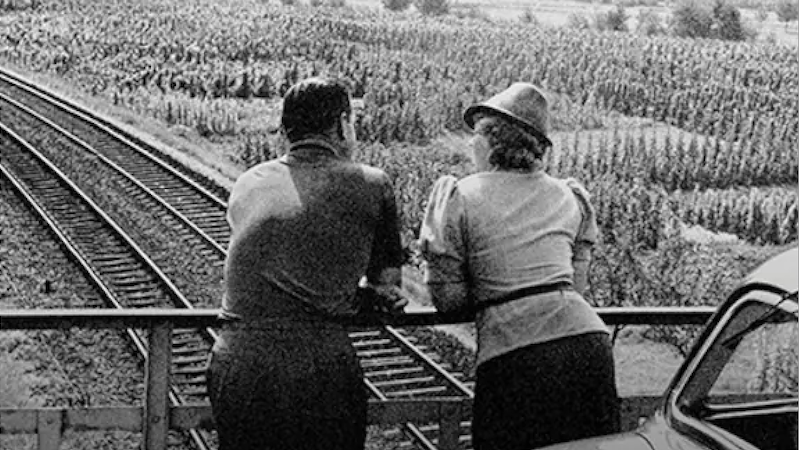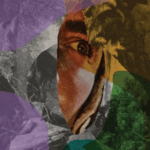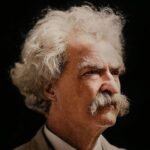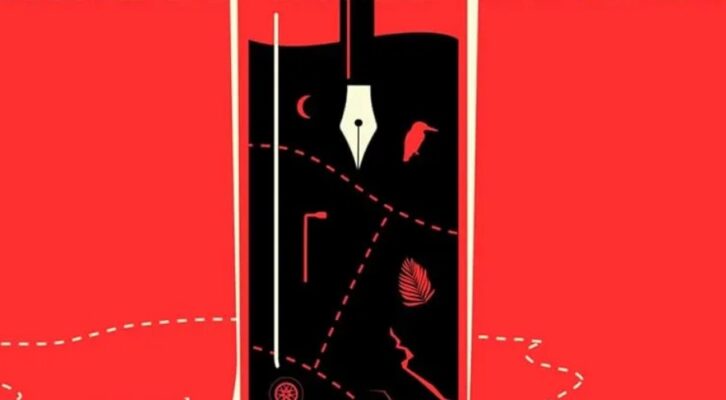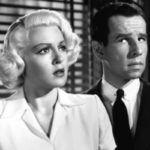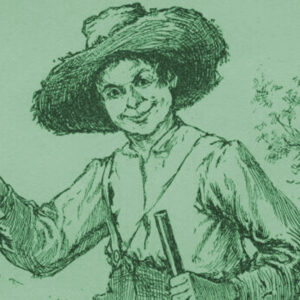Ta-Nehisi Coates Has Given #Black Lives Matter Its Foundational Text
How to Love an Imperfect Genius, and Other Considerations
My favorite works of Ta-Nehisi Coates’s haven’t been his opuses—his epic, mammothly researched pieces in The Atlantic that investigate the roots of systemic racism. My favorite pieces have often been around 1,000 words, riddled with typos and rap lyrics, appearing on his blog from 2008 to roughly 2010.
From the moment I met her, Kenyatta believed I could be a successful writer. For years after we hooked up, she was the breadwinner. When I got laid off from TIME, she said “Just keep writing,” not “Negro, you gots to get a job.” I was humbled by that, and humbled even more that she had more faith than me, and that—thus far—she was right.
That gets at the essential truth for me—a relationship couldn’t be about talking to other people. It couldn’t be about telling other people what I was gonna do; it had to be about the actual work. From that perspective, a wedding was abominable to me. It was the antithesis of everything I wanted—a vain spectacle of love, when love is to be demonstrated, it is to be done, it is to be worked like a job. Was it Andrew [Sullivan] who said religion is what you do when no one is looking? That was what we wanted out of our relationship. To always be about our business when no one was looking, and then when people were looking they would see the truth.
This is from a blog post on the occasion of Proposition 8 in California, in 2008, that meditated on the importance of marriage and Coates’s decision, at the time, not to marry his partner, Kenyatta (they have since married). Throughout his rise, he has specifically attributed his success to her help and encouragement. Such arrangements are common for writers—most receive significant help, financial or otherwise (Nabokov and Vera spring to mind), either from spouses or family members but, most likely out of pride, the impact of that help is rarely admitted so openly.
When this piece was published, I printed it out and pasted it in my journal. I was fresh out of college then, working full time and privately nursing ambitions of being a writer. I would return to this essay whenever I felt trampled by love, or by New York City. I read Coates’s blog religiously. In it, he first explored many of the themes he would master in his longer works, and engaged with his readers, whom he called “The Horde,” a reference to World of Warcraft.
I loved the assertion that love, like writing, was about hard work behind the scenes, and the implication that the reality of it was insufficiently represented in public. Very privately, I wished that I’d one day be loved in the way Coates described. His words also helped me to recognize love, so that when I found it, I knew what to do with it (not that I always got it right, but I tried).
This interpretation is also an apt metaphor for the specific work Coates performs unearthing the root causes of inequality. In a more recent post, he said, “What became clear for me… was that black inequality was not mysterious, that it was explicable, that one could delineate the actual policies without resorting to the flim-flammery of ‘cultural pathology.’” Again, he searched for the truth beneath its superficial representation.
He wrote about James Baldwin in a 2013 post:
I want to thank everyone who pointed me toward how much Baldwin really does embrace love. I am remembering what I, myself, loved about him as a young man. I came to college a total Malcolmite. I kind of still am. But Baldwin was among a set of influences that talked me out of my younger self. He is tough to pin down, because he understands the anger in black people, he feels it himself, and fears it. There is something of the atheist about him, though he does not directly say it. His encounters with racism leave him on the edge of violence and hatred, but The Fire Next Time is all about why one should walk back, all about why you should never judge yourself by the standards of the owner of the boot presently on your neck.
[…] He hates the hypocrisy and self-congratulation of white liberals and though he loves hard, though he deeply understands that race is a creation, he is never blinded by love…
At the end of this post, he describes a conversation he had with his agent, which would go on to inspire Between the World and Me, in which he asked her if anyone still wrote like Baldwin. He acknowledges that his question was rhetorical, “No one does. No one had. No one will.”
Two years and a MacArthur grant later, we see that Coates is—if not his stand-in, the closest inheritor of Baldwin’s legacy. Most importantly, he occupies the same cultural space as Baldwin, as prophet of an important and analogous civil rights movement.
For now our movement is defined by the group Black Lives Matter. This nascent movement, coalesced online, united under organizers Opal Tometi, Patrisse Cullors, and Alicia Garza, has successfully brought attention to police brutality against blacks, and attributed these incidents to systemic causes. In the past, the deaths of blacks at the hands of police were rationalized as cases of person-to-person racism, or criminality. Those cops were racist or, that guy was a thug, he deserved it. They were, effectively, isolated incidents. By linking a string of deaths of unarmed blacks—Michael Brown, Eric Garner, Tamir Rice—and, crucially, supporting them with video evidence, a pattern emerged, and we were able to recognize it for what it was: an epidemic, deeply endemic to the fabric of America.
This linking can, without too much argument, be traced back to Coates, and his landmark 2014 article for The Atlantic, “The Case for Reparations.” In it, Coates proved through extensive research what had previously been a belief held mainly by radicals: that the state had profited (“plundered” is Coates’s word of choice for this phenomenon) through legal and completely deliberate means, off the oppression of its black citizens.
If Coates is our Baldwin, we should, as Civil Rights did in the 1960s, take lessons from him and his work. We should learn from its lessons and limitations. By Coates’s definition, to love him is to do work—to adore and wrestle with him in private. If our movement is Black Lives Matter, Between the World and Me is its foundational text. It should serve as our jumping off point. This is where we should start:
1. Our politics need to be intersectional
The most persistent, credible critique of BTWAM is its lack of real engagement with women’s stories. This criticism feels more like the book falling prey to the burdens of expectation placed on artists of color. To be sure, women of color murdered in the past two years—Rekia Boyd, Sandra Bland, Tanisha Anderson—are absent from this work, and many of these women perished in much more tragic and brutal circumstances than their male counterparts, as the intersections of racism and sexism would dictate. Still, their omission feels like a mistake. These women’s deaths would serve as even better support for Coates’s claims, if he’d done the work to wrestle with feminist thought. But to truly deal with these stories and all their complexities, many of which include sexual assaults and domestic violence, may prove work for the next great black feminist intellectual—the female Ta-Nehisi Coates, if we dare to dream.
Contemporary Feminism is embattled because it has failed to fully acknowledge its shades of difference. Look no further than Roxane Gay’s recent pained exchange with Erica Jong: in order for a movement to exist today, it must address difference among its ranks.
To use another example from Coates’s work, think of his story without Kenyatta. Our movement must acknowledge the contributions, and singular challenges faced by those along the gender spectrum, by gays and lesbians, the differently abled, and those from different economic backgrounds.
2. Black America is an island
James Baldwin and Richard Wright famously sought refuge from the racism of 1960s America in Paris. Their feud, writ large in Baldwin’s Notes of a Native Son, was hatched in the Café Deux Magots, in the 6th arrondissement of Paris. Coates writes of the same café in Between the World and Me in his first trip to Paris, “I had no understanding of the local history at all. I did not think much about Baldwin or Wright. I had not read Sartre or Camus, and if I walked past Café de Flore or Les Deux Magots I did not, then, take any particular note.”
What we find in Between the World and Me, as in the Black Lives Matter movement, is a lack of connection to the rest of the world. He describes the moment he recognized that “black” has no inherent meaning—it is a placeholder, that in America it stands for the plundered, the abused, and is occupied by those with black skin. He had this awakening in a college class at Howard:
In my survey course of America, I’d seen portraits of the Irish drawn in the same ravenous, lustful, and simian way. Perhaps there had been other bodies, mocked, terrorized, and insecure. Perhaps the Irish too had once lost their bodies. Perhaps being named “black” had nothing to do with any of this; perhaps being named “black” was just someone’s name for being at the bottom, a human turned to object, object turned to pariah. […]
There was nothing holy or particular in my skin; I was black because of history and heritage. There was no nobility in falling, in being bound, in living oppressed, and there was no inherent meaning in black blood. Black blood wasn’t black; black skin wasn’t even black.
If we are to extend this line of thinking, we eventually ask: who are the other “blacks” of the world? We need to find our kindred, our allies—beyond our borders.
The American Civil Rights movement had a twin in the South African Anti-Apartheid struggle, with each movement serving, in crucial moments, as inspiration for the other. Martin Luther King, Jr. and Nelson Mandela were corollary leaders, both of them referencing each other in speeches from time to time.
Travel represents a key point of narrative departure in Between the World and Me. Along with the above passage about the transience of blackness, these two sections constitute the most metaphysical parts of a text that is otherwise direct: in speech, in history, in argument. In both these places, symbol takes over:
I wish, when I was back in that French class, that I had connected the conjugations, verbs, and gendered nouns to something grander. I wish someone had told me what that class really was—a gate to some other blue world. I wanted to see that world myself, to see the doors and everything behind them. The day of my departure, I sat in a restaurant with your mother, who’d shown me so much. I told her, “I am afraid.” I didn’t really speak the language. I did not know the customs. I would be alone. She just listened and held my hand. And that night, I boarded a starship. The starship punched out into the dark, punched through the sky, punched out past West Baltimore, punched out past The Mecca, past New York, past any language and every spectrum known to me. [emphasis mine]
American Exceptionalism holds that the US is fundamentally different from the rest of the world, based on its principles of individualism, liberty, equality, democracy, etc. This view extends to a disinterest in world affairs and history, a hesitance to explore the greater world, and a reluctance to consider ourselves in comparison to other nations. This is one explanation for our blind spots. But another, more mundane reason, is that travel is expensive, and many Blacks, Ta-Nehisi and myself included, could only afford to travel later in life.
Whatever the cause, we have so far failed to link our own struggles to those of other nations. In Coates’s terms, we have not found the “other blacks” of the world. And perhaps we should.
3. Our leaders should be intellectuals, not politicians
There were hopes during Obama’s election that he would be our philosopher-king—an educated man who would lead from a place of wisdom and worldliness. The opposite of his predecessor, the cowboy. As his term winds down, he’s been that at times, but mostly he’s exposed himself as more skilled politician than professor.
Then, look no further than our current candidates. They are beholden to the election cycle, and, more than ever—corporations. They may mouth “Black Lives Matter” during campaign season, but they cannot be trusted. Again, we should follow our Coateses and Baldwins.
We are at a crucial stage in the development of our movement—we have been given serious attention, but are yet to deliver serious change. We are being asked more questions than ever, the pressure is on us to deliver. We need to. The list of names keeps growing, the manner of our murder is becoming as inevitable as it is indescribable.
What it means to love Ta-Nehisi Coates—and Baldwin—is to learn from them, to wrestle with them, but not to be blinded by our love.




